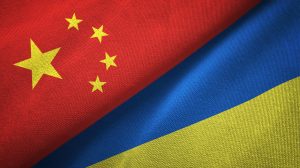Multiple news articles report Beijing snubbing Ukraine during the recent World Economic Forum (WEF) meeting in Switzerland, with Chinese Premier Li Qiang refusing to meet Ukraine’s President Volodymyr Zelenskyy.
In response, Zelenskyy clarified that he never wanted to meet Li, suggesting that the latter was not high-ranking enough to be worth meeting. “There is a Chinese premier – then our prime minister will meet with him. I would love to meet with the leader of China,” the Ukrainian president said. “As far as I know, [in China] Xi Jinping makes decisions, and in Ukraine, I make decisions. I don’t need just any dialogues; I need important decisions from the leaders who make these decisions.”
It has been nearly 700 days since Russia invaded Ukraine, and it seems clear that Zelenskyy has been playing a diplomatic long game with Moscow’s top ally, Xi Jinping. Despite Beijing’s “no-limits partnership” with Moscow, Zelenskyy had good reasons for not antagonizing Xi. Zelenskyy wants to keep Beijing onside as an investor, trade partner, and potential middleman – rather than push it away and run the risk of Xi approving major arms exports to Russia’s forces. In the years ahead, China’s deep pockets are also likely to play a role in helping Ukraine rebuild from the devastation of war.
Kyiv’s openness to Chinese mediation showcases Moscow as a hindrance to peace. This diplomatic approach not only underscores Ukraine’s commitment to peace but also aids in persuading fence-sitting nations to support U.N. accountability mechanisms.
However, the increasing Chinese exports to Moscow, which surged by 69 percent in the first 11 months of 2023 compared to the same period in 2021, before Russia’s invasion of Ukraine, proves that Zelenskyy’s nice guy behavior is not rubbing off on Xi.
On April 26, 2023, 400 days into the Russian war against Ukraine, Xi Jinping called Zelenskyy for the first time. During the conversation, Xi proposed that Kyiv explore a “political resolution” through dialogue, presumably with Russia, as a means to establish peace in Europe. China’s narratives surrounding the war mirror Russian state propaganda and find resonance in various parts of the Global South harboring grievances against the West. China’s vague 12-point peace plan does not demand Russia to withdraw its troops from Ukrainian soil, but does criticize the use of “unilateral sanctions” (the primary tool used thus far to punish Russia for its aggression).
Beijing frequently frames the conflict as a “Ukrainian crisis” or a response by Russia to perceived Western encroachment, portraying Ukraine as a mere pawn. Interviews with Chinese intellectuals conducted by the European Council on Foreign Relations reveal that many do not perceive the ongoing war as a significant departure from the past but rather as a continuation of their country’s longstanding rivalry with the United States. They argue that the United States seeks to exploit the conflict to encircle China, yet note Washington’s inability to garner broad international support for its stance. While critical of Russia’s tactics, these thinkers want to stand by Moscow to prevent American success.
Regarding Taiwan, Western support for Ukraine has neither deterred nor encouraged an invasion. However, Chinese scholars are closely examining Western responses to the war to understand how the West might react to a potential escalation over Taiwan. Most notably, the conflict may expedite Chinese efforts to reduce economic interdependence with the West.
The Chinese perspective posits that relying on economic interdependence will not shield China from potential Western confrontations. Instead, Beijing must be ready for potential sanctions. This sentiment was prominently echoed at the 11th World Peace Forum, where discussions extensively revolved around economic security, supply chain resilience, and strategies to render sanctions ineffective. Notably, during the forum, Dilma Rousseff, the former president of Brazil and current head of the New Development Bank (commonly called the BRICS Bank), strongly denounced Western initiatives of “decoupling” and “de-risking.” She advocated for global de-dollarization to protect countries against perceived Western coercion.
China has been strategically working to undermine the effectiveness of international sanctions against Russia. On February 23, 2022, Chinese Ministry of Foreign Affairs spokesperson Hua Chunying noted China’s position that “sanctions are never fundamentally effective means to solve problems.” A month later, China was already in talks with its state-owned energy and mining companies about the opportunities to pursue new investments in Russian companies or assets. Chinese non-state refiners, which account for 25 percent of China’s processing capacity, continue to place new orders for oil loaded at Russia’s eastern port of Kozmino. In April 2022, Director General of European Affairs at China’s Foreign Ministry Wang Lutong held a press conference on the EU-China summit, saying China will continue normal trade with Russia as “China is not a related party on the crisis of Ukraine.”
China and Russia have held bilateral talks on government crude oil purchases to replenish China’s strategic petroleum reserves. Ultimately, Russia replaced Saudi Arabia as China’s largest crude oil supplier. Chinese imports of Russian oil in May 2022 increased by 55 percent from the same month the previous year after climbing just 4 percent year-on-year in April 2022. Meanwhile, China’s exports of microchips, other electronic components, and raw materials to Russia have more than doubled in the first five months of 2022 compared to the same period in 2021.
Ukraine faces a complex diplomatic challenge, necessitating adept diplomacy and empathy from Western partners to prevent substantial Chinese support for Russia’s war. While realistic goals should be prioritized, managing relations with China shouldn’t hinder Ukraine’s pursuit of global interests, such as fostering economic ties with Taiwan and addressing human rights concerns regarding China. No matter what Kyiv does to stay on Beijing’s good side, China’s ability and willingness to pressure Russia to withdraw its troops from Ukraine are questionable.

































